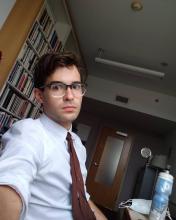- Friday, April 28, 2023 - 3:00pm to 5:00pm
FBH Faculty Lounge
Dissertation abstract:
This dissertation examines how twentieth-century writers responded to the US state’s attempts to surveil, quantify, and administer US populations, from the passage of the New Deal and the implementation of the Social Security Act (1937–1940) to the beginning of the neoliberal deregulation of the late 1970s. During this period, the state increasingly relied upon modes of perception, which I describe as “informatic,” that render the world into legible data. I argue that writers used the novel to mediate the embodied experience of becoming data, forming subjectivities in tension with the state’s impositions. Cultural histories of information have thus far privileged the predominantly straight, white authors of canonical postmodernism, who use the vocabularies of cyberneticians and data theorists to produce narratives of technology’s supposedly alienating power. In doing so they have overlooked the minoritized writers who offer even more trenchant critiques of how information, surveillance, and the state manifest in the lived experience of real people, who never encounter technology in its idealized form but always in material, racialized, and gendered fashions.
I read novels by Ann Petry, Richard Wright, Patricia Highsmith, James Baldwin, Paul Bowles, William S. Burroughs, Sam Greenlee, Thomas Pynchon, and Leslie Marmon Silko that supplement our understanding of data and surveillance by showing how particular technologies were integrated into a capitalist mode of production and how they affect minoritized subjects. I show how these novels recast the act of being known by the state as a social process through which race, sexuality, and privacy are continuously generated and managed. The state is alternatively decried and yearned for by these authors, as they ask what other modes of organization can be imagined. By paying attention to the practices of the informatic state, both how the state knows and what it knows, these novels give us a picture that is not all-powerful and unitary but complex and ambivalent, composed of human labor and human decisions—and thus containing the possibility for structural change and reconstitution.
Committee: Jo Park (chair), James English, JC Cloutier, Emily Steinlight
Time and location: Friday, April 28th at 4pm, English Faculty Lounge (135 Fisher-Bennett Hall, 3340 Walnut St) or via zoom
Featuring Devin William Daniels

 Department of English
Department of English
